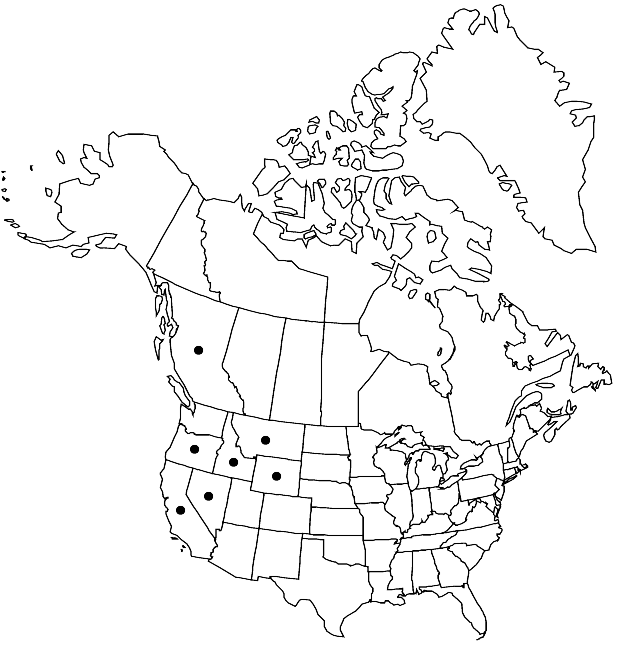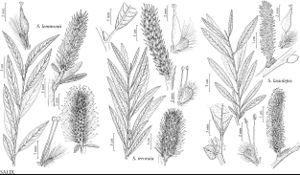Salix lemmonii
Willows Calif., 88. 1879.
Plants 1.2–4 m, (sometimes forming clones by stem fragmentation). Stems: branches (sometimes highly brittle at base), yellowbrown or redbrown, not to sometimes strongly glaucous, (dull to slightly glossy), glabrous or puberulent at nodes; branchlets yellowbrown to redbrown, (weakly or strongly glaucous or not), puberulent, (buds alba-type or intermediate, scale inner membranaceous layer free, not separating from outer layer). Leaves: stipules absent or rudimentary on early ones, foliaceous on late ones, apex acute; petiole convex to flat adaxially, 5–16 mm, tomentose or velvety adaxially; largest medial blade (sometimes amphistomatous), lorate or very narrowly to narrowly elliptic, 44–110 × 6–22 mm, 3.4–9.9 (–12) times as long as wide, base convex or cuneate, margins flat to slightly revolute, entire or shallowly serrulate, apex acuminate to acute, abaxial surface glaucous, sparsely short or long-silky to glabrescent, hairs (white, also ferruginous), straight or wavy, adaxial slightly glossy, sparsely short-silky, (hairs also ferruginous); proximal blade margins entire or shallowly serrulate; juvenile blade reddish or yellowish green, densely long-silky abaxially, hairs white and ferruginous. Catkins flowering just before or, sometimes, as leaves emerge; staminate stout, (1.4–2.7–) 16–28 × 9–17 mm, flowering branchlet 1–3 mm; pistillate loosely flowered, stout, (1.5–2.7–) 19–44 (–65 in fruit) × 10–18 mm, flowering branchlet 1–6 mm; floral bract brown or bicolor, 1.1–2.4 mm, apex rounded or convex, abaxially hairy, hairs straight. Staminate flowers: adaxial nectary narrowly oblong, oblong, or ovate, 0.3–0.9 mm; filaments distinct or connate less than 1/2 their lengths, glabrous or hairy on proximal 1/2 or basally; anthers yellow, ellipsoid, shortly cylindrical, or globose, 0.5–0.9 mm. Pistillate flowers: adaxial nectary oblong, narrowly oblong, or ovate, 0.4–1 mm; stipe 1.1–2.1 mm; ovary pyriform, beak sometimes slightly bulged below styles; ovules 12 per ovary; styles 0.3–1 mm; stigmas flat, abaxially non-papillate with rounded or pointed tip, 0.2–0.3–0.48 mm. Capsules 5–7 mm. 2n = 76.
Phenology: Flowering early Mar-late Jun.
Habitat: Streams, lakeshores, wet meadows, springs, old burns in subalpine conifer forests, sandy, granite substrates
Elevation: 1400-3500 m
Distribution

B.C., Calif., Idaho, Mont., Nev., Oreg., Wyo.
Discussion
See 85. Salix drummondiana for comments on differences.
Hybrids:
Salix lemmonii forms natural hybrids with S. geyeriana.
Selected References
None.
Lower Taxa
"-0.48mm" is not declared as a valid unit of measurement for this property.
